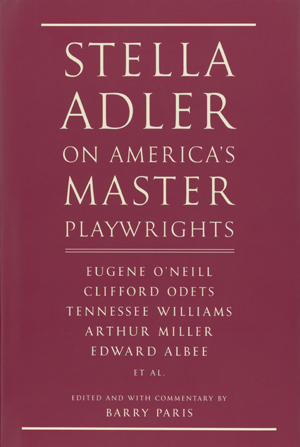

“Mommy, is that God?” a little girl once whispered to her mother as Stella Adler swept into a party in New York City. The girl’s mistake was understandable: Adler was known as a presence of divine proportions, a tall, glamorous woman whose grand gestures and dramatic one-liners captivated audiences both large and small. Adler began acting at age four in the “Independent Yiddish Art Company,” run by her parents, and continued her acting career until 1961. In 1931, Adler joined the Group Theatre, where she worked closely with Harold Clurman and Lee Strasberg.
In 1934, she went with Clurman to Paris to study with Constantin Stanislavski, an acting great famous for developing the Stanislavski System, a set of acting techniques that was tweaked by Strasberg and is known today as Method acting. Adler believed strongly that actors should use their imagination to synthesize characters, whereas Strasberg relied on emotional memory exercises, and the two eventually split over their differences. Adler left the Group Theatre and later opened her own acting school, The Stella Adler Studio of Acting, in 1949 in New York City, where she taught famous actors such as Marlon Brando and Robert De Niro. She opened another school, The Stella Adler Academy of Acting, in Los Angeles in 1985 with her friend and protégé Joanne Linville, who continues to run the school today.
The Ransom Center hold Adler’s papers, which were used extensively by Barry Paris in his book Stella Adler on America’s Master Playwrights (Knopf). The volume peeks into Adler’s classroom and explores the acting master’s take on American playwrights such as Eugene O’Neill, Tennessee Williams, Arthur Miller, Edward Albee, Clifford Odets, and others.
The book was put together using transcripts from Adler’s script analysis classes, where lively discussions of American culture, socioeconomics, and history fleshed out the context of the plays—a practice on which Adler placed the utmost importance. Adler once said of the great artists featured in the book: “these playwrights all saw what was wrong.” She believed it was imperative for the actor not only to bring personal experience to the role, but to truly understand the beliefs, prejudices, and lives of the playwrights who crafted the plays she taught. Peter Bogdanovich, one of Adler’s former students, praised the book for “bring[ing] back the sound of Stella’s unique voice and thought processes, as well as her own particular vision.”
Paris, the book’s editor, did extensive research in the Ransom Center’s holdings on Stella Adler and Harold Clurman.